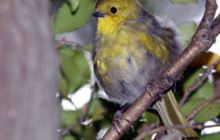Review of the Wildlife Act 1953
Introduction
The 70-year-old Wildlife Act 1953 is being repealed and replaced with modern legislation that will better protect native species.Strong support for replacing the Wildlife Act
In 2022, the Department began a first principles review of the Wildlife Act 1953. DOC held 40 hui with tangata whenua, key stakeholders and statutory bodies to hear their views on the problems with the current Act, how to improve it, and their aspirations for future species management.
The feedback from this engagement indicated that there is widespread support for reforming the Wildlife Act and a shared vision for indigenous species to be thriving.
As work on the review progressed, DOC received valuable advice from an independent expert Strategic Oversight Group. The group brought diverse skills and expertise in:
- te ao Māori
- conservation
- law and environmental policy
- tourism
- science
- game animal management
- governance.
The 10 members of the group were: Aroha Mead (chair), Bruce Clarkson, Debs Martin, Garry Ottmann, Greg Duley, Hoani Langsbury, Jacinta Ruru, Nicola MacDonald, Rebecca Ingram, and Shay Schlaepfer.
Read the Strategic Oversight Group advice provided to the Minister (PDF, 284K) on 27 April 2023.
Issues with the current Act
More than 4,000 of our native species are threatened with extinction or at risk of becoming threatened if declines continue. There are many drivers of biodiversity loss, such as:
- climate change
- changes in how land and waters are used
- the impacts of introduced animals and plants
- pollution
- the exploitation of some species
Repealing and replacing the Wildlife Act is an opportunity to consider the best way to protect our precious taonga species, and to address the issues identified in the review of the Act.
The current Act:
- lacks a clear purpose
- does not address threatened species very well
- does not cover many species at risk of extinction
- prevents fulfilment of some obligations under Te Tiriti o Waitangi.
Replacing the Wildlife Act will mean we can:
- be clearer about protection for native species
- have better tools to address current and future threats to species
- better consider the variety of ways people value and want to interact with species
- better incorporate mātauranga Māori and tikanga
- enable Te Tiriti o Waitangi/Treaty of Waitangi responsibilities to be realised in species management and conservation
View a summary of the current Wildlife Act 1953.
Next steps
Work to repeal and replace the Wildlife Act 1953 remains a priority. We are considering options for a new and updated species Act and its role in the broader conservation system. The key elements include:
- its purpose
- which species are covered by the Act
- how species are protected
- how activities might be regulated
- how decisions are made.
Our work in 2024 and 2025 will focus on developing a public consultation document with options for a new species Act. Any further significant updates on the work will be provided on this webpage.
Past announcements on the review of the Wildlife Act 1953
Read the July 2023 Report back on the review of the Wildlife Act 1953 (PDF, 1622K)
Media release 9 September 2023: New Wildlife Act to better protect native species

